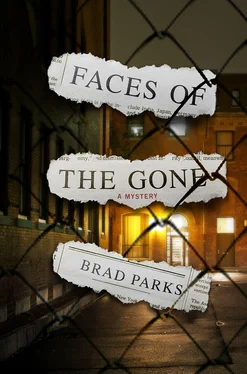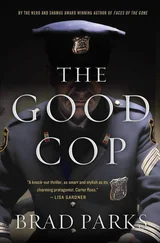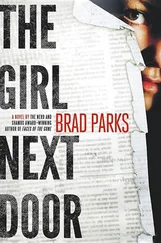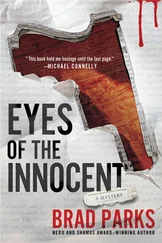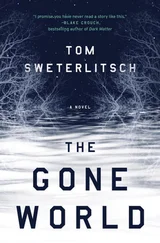Brad Parks - Faces of the Gone
Здесь есть возможность читать онлайн «Brad Parks - Faces of the Gone» весь текст электронной книги совершенно бесплатно (целиком полную версию без сокращений). В некоторых случаях можно слушать аудио, скачать через торрент в формате fb2 и присутствует краткое содержание. Год выпуска: 2010, ISBN: 2010, Издательство: Minotaur Books, Жанр: Триллер, на английском языке. Описание произведения, (предисловие) а так же отзывы посетителей доступны на портале библиотеки ЛибКат.
- Название:Faces of the Gone
- Автор:
- Издательство:Minotaur Books
- Жанр:
- Год:2010
- ISBN:9780312574772
- Рейтинг книги:3 / 5. Голосов: 1
-
Избранное:Добавить в избранное
- Отзывы:
-
Ваша оценка:
- 60
- 1
- 2
- 3
- 4
- 5
Faces of the Gone: краткое содержание, описание и аннотация
Предлагаем к чтению аннотацию, описание, краткое содержание или предисловие (зависит от того, что написал сам автор книги «Faces of the Gone»). Если вы не нашли необходимую информацию о книге — напишите в комментариях, мы постараемся отыскать её.
Faces of the Gone — читать онлайн бесплатно полную книгу (весь текст) целиком
Ниже представлен текст книги, разбитый по страницам. Система сохранения места последней прочитанной страницы, позволяет с удобством читать онлайн бесплатно книгу «Faces of the Gone», без необходимости каждый раз заново искать на чём Вы остановились. Поставьте закладку, и сможете в любой момент перейти на страницу, на которой закончили чтение.
Интервал:
Закладка:
“You know one of them?” I asked.
“Yeah. Tyrone Scott. Called himself ‘Hundred Year.’ He told people he was supposed to get himself a hundred years in jail for killing some guy.”
“So I take it he got paroled.”
“Ah, he was full of it,” the man said. “You know how these young bucks are. Always trying to puff up their damn reputations, trying to make themselves all bad. He was just caught selling near a school.”
That was one of the Catch-22s of urban drug sales in New Jersey: there were stiffer penalties for dealing within a thousand feet of a school, the difference between jail time and no jail time. But the thousand-foot standard was set with the suburbs in mind. In the city, everything was within a thousand feet of a school. It was the main reason New Jersey led the nation in the disparity between its prison population (60 percent black) and its general population (12 percent black).
“So how’d you know him?”
“I go with his mama a little bit. She asked me to come down with this,” he said, holding up the flowers.
“Any idea what he did to end up here?”
“What you think?”
“Dealer?”
“Nah,” the man said. “He was just a hustler.”
In Newark, the distinction between “dealer” and “hustler” was an important one. A “dealer” is a guy who does nothing but sell drugs, and is mostly despised. A “hustler” is a more sympathetic figure: he only sells drugs out of necessity, to keep the lights turned on.
Which is not to say a hustler couldn’t get himself in the same kind of trouble a dealer did.
“What was his hustle?” I asked.
“Diesel,” the man said. Heroin.
“Did he live around here?”
“Naw. His mama lives over off South Orange Avenue by the Garden State Parkway. He hustled in front of the chicken shack over there.”
I was keeping mental notes at this point. Sometimes people clam up when you pull out a notebook and I didn’t want to spook this guy.
“So how come he ended up down here?” I asked. “I mean, that neighborhood has to be three miles from here.”
“His mama was asking the same question,” he said, then started mimicking a woman’s voice: “ ‘What was that boy doin’ down there? Why he leave his hood? Don’t he know they ain’t got no respect for nothing down there?’ ”
“She have any idea why this happened to him?”
“She didn’t even know he hustled. She didn’t want to know. He’d be out on that corner hustling all day and she’d say, ‘Ain’t it nice of Tyrone to keep an eye on the neighborhood? He’s such a good boy.’ ”
“He in a gang?”
“Don’t think so. He was too old for that.”
“How old was he?”
“Tyrone? Hell. Twenty-eight, twenty-nine?”
In gang years, that was the equivalent of about ninety-seven. Gang members reached middle age by eighteen. By twenty-three or twenty-four, after a quick stint or two in jail, you were considered OG, an “Original Gangster.” No one made it to thirty in a gang. By that age, you were either dead, in jail for an extended stretch, or you had finally found the good sense to change occupations.
“Well, I best be moving on,” the man said. “My bones is getting cold.”
“Mine too. Thanks for talking.”
“Uh-huh. Just make sure the police catch whoever did this, okay?” the man said, as he began walking toward the shrine with his flowers. “I don’t know if Tyrone’s mama could take it if she don’t get a little justice.”
With early-stage hypothermia setting in, I was making the teeth-chattering walk back to the car when I saw Tommy emerge from a house at the far end of the street.
“Hurry up,” I hollered. “Pretend there’s a sale at John Varvatos.”
“What’s the matter?” he shot back as he caught up to me. “You’re nervous because it’s been four hours since you checked on your fantasy football team?”
“Hey, that’s important stuff. I’m thisclose to pulling off a blockbuster deal for Peyton Manning.”
“Let’s just say my fantasies involving football teams are a little different from yours.”
We hopped into my car to escape the cold just as a gust of wind rocked it. I got us rolling and clicked on the radio, where an all-news station was midway through another report about the troubled newspaper industry. For those of us who had been living with the devastation, this hardly qualified as news.
People think newspapers are struggling because the Internet stole our readers. But that’s not the problem; when readers go online, they’re still clicking on our sites for their news. Between print and online, most newspapers have more readers than they’ve ever had. We don’t make much money off online readers at the moment, because most advertisers are still learning how best to utilize the Web. But we’ll figure that out eventually.
The real problem is that the Internet stole our classified advertising. Every daily newspaper used to have a nice thick section stuffed with nothing but ads-used cars, apartments for rent, houses for sale, secondhand pianos, job postings, and so on. We were the community’s marketplace and in most areas we were the only game in town. As an industry, our entire profit margin came from that one section.
That’s gone now. Gone to Craigslist, to eBay, to Monster, to Autotrader. Combine that with some of our other issues-shrinking retail advertising budgets, soaring newsprint prices, increased distribution costs, and so on-and it made for a fiscal conflagration that was threatening to consume an entire American institution.
“Can we turn that off?” Tommy said. “It’s like listening to someone narrate your own funeral.”
“Happy to oblige,” I said.
It was easy to get caught up in the sense of doom. The threat of layoff was constant and I didn’t care to think about how many good people we had lost already. Yet for all the Internet had done to shake up newsrooms, the basics of what we did-gather information and disseminate it in a speedy and sensible manner-were unchanged. So I turned my attention back toward that job.
“You learn anything out there?” I said, holding my hand against the car’s heater, which was finally spitting out lukewarm air.
“Not really. Nobody seems to know anything about these guys. I just keep hearing the same thing: there were four shots, no one called the police because gunfire in the neighborhood is so common, suddenly there are four dead bodies. Everyone is a little freaked out.”
“Sounds like stuff you can feed to Whitlow and Hays for the daily.”
“Yeah. What did you get?”
I related the conversation I had with Tyrone Scott’s mama’s boyfriend.
“Well, that’s a little something,” Tommy said. “Should we check out that chicken shack?”
“No, I’ll do that. Let’s split up. Why don’t you visit that florist and see if they can tell you who ‘Tynesha’ is.”
Tommy agreed and, as I drove back to the office, he subjected me to a harangue about how my shoes were just wrong, saying I should free myself from the bondage of laces and get slip-ons.
“Tommy, I’m born and bred WASP,” I reminded him. “You ought to be proud of me for not wearing shoes with tassels.”
Upon returning to the office, I made a quick Coke Zero pit stop at the break room vending machines. There, I found Tina Thompson, our city editor, reading Fertility for Dummies. Tina was excessively candid about her sex life, and the thunderous ticking of her thirty-eight-year-old biological clock could be heard as far away as the Pine Barrens. It never failed to amuse me how a woman whose life had until recently consisted of work, yoga, jogging-and a series of relationships that lasted between one night and two weeks-had suddenly entered a nesting phase. Her search for Mr. Right had taken on a highly procreative bent. She wasn’t looking for a life partner, just a mating partner: a man who was, above all else, fecund.
Читать дальшеИнтервал:
Закладка:
Похожие книги на «Faces of the Gone»
Представляем Вашему вниманию похожие книги на «Faces of the Gone» списком для выбора. Мы отобрали схожую по названию и смыслу литературу в надежде предоставить читателям больше вариантов отыскать новые, интересные, ещё непрочитанные произведения.
Обсуждение, отзывы о книге «Faces of the Gone» и просто собственные мнения читателей. Оставьте ваши комментарии, напишите, что Вы думаете о произведении, его смысле или главных героях. Укажите что конкретно понравилось, а что нет, и почему Вы так считаете.
